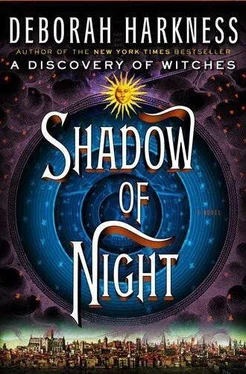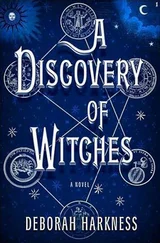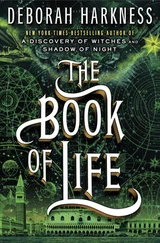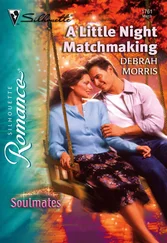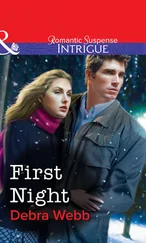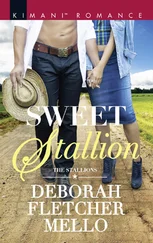“She shouldn’t be allowed to speak at all, Matt. You must keep her quiet,” Kit insisted.
“What we need is a woman, someone to advise Diana. Why is there not one daughter, wife, or mistress to be had among the five of you?” Matthew demanded. Deep silence fell.
“Walter?” Kit asked archly, sending the rest of the men into a fit of laughter and lightening the heavy atmosphere as though a summer storm had blown through the room. Even Matthew joined in.
Pierre entered as the laughter faded, kicking up sprigs of rosemary and lavender strewn among the rushes laid down to keep dampness from being tromped through the house. At the same moment, the bells began to toll the hour of twelve. Like the sight of the quinces, the combination of sounds and smells took me straight back to Madison.
Past, present, and future met. Rather than a slow, fluid unspooling, there was a moment of stillness as if time had stopped. My breath hitched.
“Diana?” Matthew said, taking me by the elbows.
Something blue and amber, a weave of light and color, caught my attention. It was tightly meshed in the corner of the room, where nothing could fit but cobwebs and dust. Fascinated, I tried to move toward it.
“Is she having a fit?” Henry asked, his face coming into focus over Matthew’s shoulder.
The tolling of the bell stopped, and the scent of lavender faded. Blue and amber flickered to gray and white before disappearing.
“I’m sorry. I thought I saw something in the corner. It must have been a trick of the light,” I said, pressing my hand to my cheek.
“Perhaps you are suffering from timelag, mon coeur ,” Matthew murmured. “I promised you a walk in the park. Will you go outside with me to clear your head?”
Maybe it was the aftereffects of timewalking, and perhaps fresh air would help. But we had just arrived, and Matthew hadn’t seen these men for more than four centuries.
“You should be with your friends,” I said firmly, though my eyes drifted to the windows.
“They’ll still be here, drinking my wine, when we return,” Matthew said with a smile. He turned to Walter. “I’m going to show Diana her house and make sure she is able to find her way through the gardens.”
“We will need to talk further,” Walter warned. “There is business to discuss.”
Matthew nodded and tucked his hand around my waist. “It can wait.”
We left the School of Night in the warm parlor and headed outdoors. Tom had already lost interest in the problems of vampire and witch and was engrossed in his reading. George was similarly consumed by his own thoughts and busily writing in a notebook. Kit’s glance was watchful, Walter’s wary, and Henry’s eyes were filled with sympathy. The three men looked like an unkindness of ravens with their dark clothes and attentive expressions. It reminded me of what Shakespeare would soon say about this extraordinary group.
“How does it begin?” I murmured softly. “ ‘Black is the badge of hell ’?”
Matthew looked wistful. “‘Black is the badge of hell / The hue of dungeons, and the school of night .’”
“The hue of friendship would be more accurate,” I said. I’d seen Matthew manage the readers at the Bodleian, but his influence over the likes of Walter Raleigh and Kit Marlowe was still unexpected. “Is there anything they wouldn’t do for you, Matthew?
“Pray God we never find out,” he said somberly.
On Monday morning I was tucked into Matthew’s office. It was located between Pierre’s apartments and a smaller chamber that was used for estate business, and it afforded a view toward the gatehouse and the Woodstock road.
Most of the lads—now that I knew them better, it seemed a far more fitting collective term than the grandiose School of Night—were closeted in what Matthew called the breakfast room, drinking ale and wine and applying their considerable imaginations to my backstory. Walter assured me it would, when complete, explain my sudden appearance at Woodstock to curious residents and alleviate questions about my odd accent and ways.
What they had concocted so far was melodramatic in the extreme. This was not surprising given that our two resident playwrights, Kit and George, came up with the key elements of the plot. The characters included dead French parents, avaricious noblemen who had preyed on a helpless orphan (me), and aged lechers intent on stripping me of my virtue. The tale turned epic with my spiritual trials and conversion from Catholicism to Calvinism. These led to voluntary exile on England’s Protestant shores, years of abject poverty, and Matthew’s fortuitous rescue and instantaneous regard. George (who really was something of a schoolmarm) promised to drill me in the particulars when they had applied the finishing touches to the story.
I was enjoying some quiet, which was a rare commodity in a crowded Elizabethan household of this size. Like a troublesome child, Kit unerringly gauged the worst moment to deliver the mail, announce dinner, or request Matthew’s help with some problem. And Matthew was understandably eager to be with friends he had never expected to see again.
At present he was with Walter and I was devoting my attention to a small book while awaiting his return. He’d left his table by the window littered with bags of sharpened quills and glass pots full of ink. Other tools were scattered nearby: a stick of wax to seal his correspondence, a thin knife to open letters, a candle, a silver shaker. This last was full not of salt but sand, as my gritty eggs this morning had proved.
My table held a similar shaker to set the ink on the page and keep it from smudging, a single pot of black ink, and the remains of three pens. I was currently destroying a fourth in an effort to master the complicated swirls of Elizabethan handwriting. Making a to-do list should have been a snap. As a historian I had spent years reading old handwriting and knew exactly how the letters should look, what words were most common, and the erratic spelling choices that were mine to make in a time when there were few dictionaries and grammatical rules.
It turned out that the challenge lay not in knowing what to do but in actually doing it. After working for years to become an expert, I was a student again. Only this time my objective wasn’t to understand the past but to live in it. Thus far it had been a humbling experience, and all I’d managed was to make a mess of the first page of the pocket-size blank book Matthew had given me this morning.
“It’s the Elizabethan equivalent of a laptop computer,” he’d explained, handing me the slim volume. “You’re a woman of letters and need somewhere to put them.” I cracked the tight binding, releasing the crisp smell of paper. Most virtuous women of the time used these little books for prayers. Diana
There was a thick blot where I’d pressed down at the beginning of the D and by the time I reached the last A the pen was out of ink. Still, my effort was a perfectly respectable example of the period’s Italic hand. My hand moved far more slowly than Matthew’s did when he wrote letters using the squiggly Secretary script. That was the handwriting of lawyers, doctors, and other professionals, but too difficult for me at present. Bishop
That was even better. But my smile quickly dissolved, and I struck out my last name. I was married now. I dipped the pen in the ink. de Clermont
Diana de Clermont. That made me sound like a countess, not a historian. A drop of ink fell wetly onto the page below. I stifled a curse at the black splotch. Happily, it hadn’t obliterated my name. But that wasn’t my name either. I smudged the blob over “de Clermont.” You could still read it—barely. I steadied my hand and deliberately formed the correct letters. Roydon.
Читать дальше
